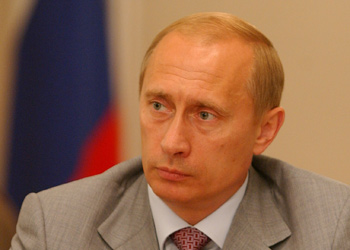Putin’s Letter to the Poles
Russian Prime Minister Vladimir Putin arrived in Westerplatte today, but ahead of his trip, as any polite visitor would do, he has written a letter to his hosts.
In the letter, the Russian prime minister speaks primarily of “the most disastrous and slaughterous war that Europe and the entire humanity have ever lived through” – World War II.
But perhaps the most surprising part of the letter is the acknowledgement of the Soviet Union’s role in the Molotov-Ribbentrop Pact, particularly as a few weeks ago state-controlled TV channel broadcast a documentary claiming that Poland was planning an invasion of the Soviet Union in alliance with Nazi Germany.
In the letter, Putin writes: “There is no doubt that one can have all the reasons to condemn the Molotov-Ribbentrop Pact concluded in August of 1939. But a year before, in Munich, France and England signed a well-known treaty with Hitler and thus destroyed all the hope for a united front to fight fascism.” However, he goes on to rationalise the Soviet leadership’s signing of the pact, stating that otherwise it faced the prospect of war on two fronts – with Germany and Japan: “The Soviet diplomacy was quite right at that time to consider it, at least, unwise to reject Germany’s proposal to sign the Non-Aggression Pact when USSR’s potential allies in the West had already made similar agreements with the German Reich and did not want to cooperate with the Soviet Union, as well as to be confronted with the Nazi almighty military machine alone.”
Putin concludes from the events of history that “it is impossible to set up an efficient system of collective security without involvement of all countries of the continent, including Russia” – a direct allusion to the U.S.’s plans for a missile defence system in Poland and the Czech Republic.
In one part of the letter, the prime minister decries the manipulation of historical events for political gains – something that his government has been accused of for years. He writes that “the canvas of history is not a third-rate copy which can be roughly retouched or, following customer’s orders, modified by the addition of bright of dark tints.” And yet, nowhere does he admit his or his government’s guilt in such practices.
Another sensitive issue – that of the massacre of Polish officers by Soviet troops at Katyń – is mentioned: “The people of Russia, whose destiny was crippled by the totalitarian regime, fully understand the sensitiveness of Poles about Katyn where thousands of Polish servicemen lie. Together we must keep alive the memory of the victims of this crime.”
The letter is a step away from previous statements that have come from the Russian leader, such as Putin’s claim that the fall of the Soviet Union was “the greatest geopolitical tragedy of the 20th century”. But it nonetheless fails to mention many Soviet crimes, some of which are still denied within Russia, and focusses primarily on the acts of the Nazi aggressors. While Putin hopes that “Russian-Polish relations will, sooner or later, come to such high level, to the level of genuine partners”, most people in Poland realise that this will not happen until the record is set truly straight in Russia.
The entire letter (in English translation) can be read here.

